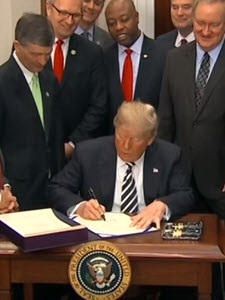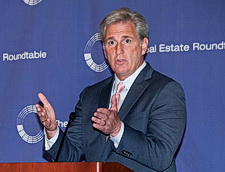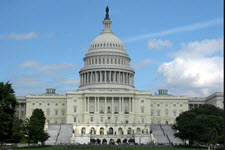Revisions to the 2010 Dodd-Frank Act – including significant Roundtable-supported reforms to the Basel III High Volatility Commercial Real Estate (HVCRE) Rule – were signed into law by President Trump yesterday, two days after the House passed The Economic Growth, Regulatory Relief, and Consumer Protection Act (S. 2155).
 |
|
Revisions to the 2010 Dodd-Frank Act – including significant Roundtable-supported reforms to the Basel III High Volatility Commercial Real Estate (HVCRE) Rule – were signed into law by President Trump yesterday, two days after the House passed The Economic Growth, Regulatory Relief, and Consumer Protection Act (S. 2155). |
- S. 2155 previously passed the Senate in March with the same clarifications and reforms as the House bill. The HVCRE Rule created needless confusion and increased borrowing costs in the industry for CRE Acquisition, Development and Construction (ADC) lending.
- Senate Banking Committee Chairman Mike Crapo (R-ID) commented, “This step toward right-sizing regulation will allow local banks and credit unions to focus more on lending, in turn propelling economic growth and creating jobs on Main Street and in our communities.” (Sen. Mike Crapo News Release, May 22)
- Details of the new measure addresses key deficiencies in current and proposed regulations. Real Estate Roundtable HVCRE Working Group Co-Chair Joseph Forte (Sullivan and Worcester) noted, “This legislative action is a welcome solution to a poorly designed regulatory capital scheme that has not matched with risk. This caused an unnecessary cost burden to all commercial banks and their real estate development customers. In addition, it restores to borrowers the ability to offer appreciated land value as equity to banks, when validated through appraisal practices established in earlier statutes.” (Passage of Dodd-Frank Reform Encourages Investment, Economic Growth in Local Communities –Roundtable News Release, May 22)
- The Roundtable and twelve other real estate organizations detailed the industry’s HVCRE policy positions and urged inclusion of the language in broader Dodd-Frank reform legislation (S. 2155). (Roundtable HVCRE Comment Letter, March 2)
- “The Reform Bill, in provisions that are now effective, overrides certain highly conservative provisions in both the federal banking agencies’ (Banking Agencies) Basel III capital rule and their interpretations of it.” ( Dodd Frank 2.0: Reforming U.S. HVCRE Capital Treatment, Gibson Dunn, May 24)
Since 2015, The Roundtable’s HVCRE Working Group and industry coalition partners have played a key role in advancing specific reforms to the HVCRE Rule. During next month’s Real Estate Roundtable Annual Meeting, HVCRE will be a focus of discussion, with more specific details offered during the Real Estate Capital Policy Advisory Committee (RECPAC) meeting on June 14.



